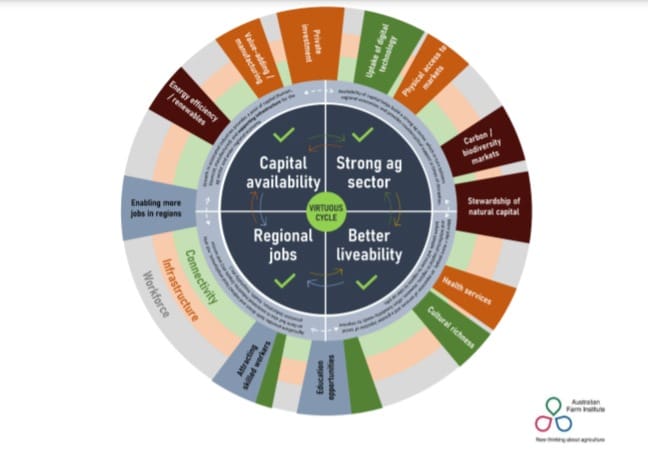 A NEW report has recommended stimulatory funding to improve regional education, employment, business capacity and infrastructure to benefit Australia’s agricultural economy.
A NEW report has recommended stimulatory funding to improve regional education, employment, business capacity and infrastructure to benefit Australia’s agricultural economy.
The Stronger Ag Sector Stronger Regions report commissioned by NSW Farmers from the Australian Farm Institute has found a unique connection between a strong agricultural sector and strong regional communities.
The report has concluded that connectivity, infrastructure and workforce are key factors to the success of farming and the regions, with strong potential to deliver lasting economic stability. It has recommended that regional stimulatory spending target regional jobs, education and training, uptake of digital technology, physical access to markets, energy efficiency and better liveability.
In particular, the AFI strongly recommends that stimulatory funding should address:
- provision of expanded education opportunities across all levels of schooling
- co-designed employment partnership programs between agricultural industries and Government
- acceleration of industry and regional digital capacity and capability via targeted investment in infrastructure and skills
- incentivising co-location of complementary businesses via strategic supply chain scenario planning
- the urgent remedy of those physical infrastructure limitations which hamper the sector’s efficiency and impinge on regional liveability
The report also found that the 2020 COVID pandemic has highlighted the advantages of secure food sovereignty.
“In times of great economic stress and uncertainty, the agricultural industry ensured ample food stocks were available to replenish supermarket shelves.
“In doing so, the sector created a buffer which lessened the socioeconomic disruption resulting from business shutdowns,” the report found.
“Put simply: as farmers feed us all, we as a society have a responsibility to ensure the sector remains productive and continues to provide food security.
“Without interfering in markets to a degree that could create perverse outcomes, this investment, incentivisation and intervention could – and should – be done in a manner that ensures vibrant regional communities can thrive, improving quality of life for regional Australians and taking pressure off overstretched urban systems.”
The report said it is essential that decision-makers in government and in industry strategically think about and act on the themes and priorities presented, envisioning goals for agriculture and regional communities many decades ahead and carefully considering the scenarios resulting from inaction.
NSW Farmers President James Jackson said this report confirms what the association had suspected for some time; that the fates of farms and farming communities and closely intertwined.
“Agriculture is an increasingly important sector both in terms of economic output and food security, and we’re playing a key role in removing carbon from the atmosphere.
“Hopefully, this report will prompt governments to further invest in rural and regional communities and the future of agriculture, as we will get a win-win for everyone,” he said.
While both the state and federal governments have regional growth priorities, Mr Jackson said these need to complement each other and respond to the needs of regional communities. He said the report identified five policy priorities that would help drive future success:
- supply chains and infrastructure
- water and environmental reform
- cutting red tape for farm businesses
- job creation
- upskilling, training and education
“NSW Farmers has a goal of growing the agriculture sector in our state to $30 billion by 2030, and that means more regional jobs and more opportunities for our communities,” Mr Jackson said.
“When COVID arrived, people started flocking to the regions and there’s clearly a strong level of interest in developing these towns and cities in the right way.
“What we’re doing is looking at every possible way to grow into the future, and with the right support from governments on investment and things like managing land use, we can make sure there’s opportunities for everyone.”

HAVE YOUR SAY